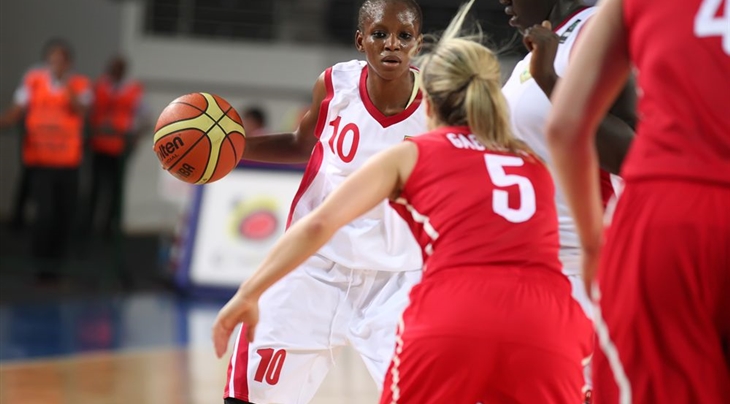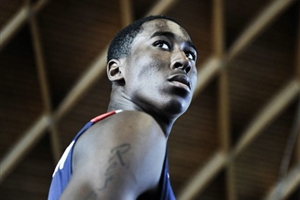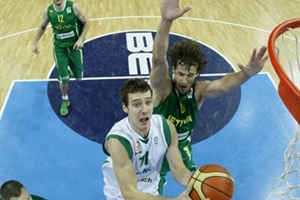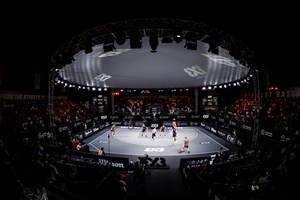
SEN - Players with promise on show in Africa
DAKAR (U18 FIBA Africa Championship/FIBA World Championship for Women) - Some of Africa's rising stars that could end up featuring at the 2014 FIBA World Championship for Women are representing their countries in youth competition this week.
The U18 Afrobasket Women is underway in Senegal.
Hosts Senegal have started as the main title contenders but Mali, who won the U16 Afrobasket Women in Egypt two years ago, should give them a run for their money.
Mali were the first African team to win a game in a world stage tournament when they beat Brazil 58-51 at the U17 FIBA World Championship in Amsterdam last month.
For the Dakar challenge, Mali have Fanta Guindo and Aminata Traore, two players who represented the country at the FIBA Olympic Qualifying Tournament for Women (OQTW) in Ankara, Turkey.
They have been described by Mali Basketball Federation secretary general Salamatou Maiga as key players for the "future of the women's national team."
At the OQTW, Guindo was the team's second top scorer at four points per game while Traore was Mali's second leading rebounder at 3.5 per contest.
Mali missed a large number of foreign-based players at the OQTW, and these two and the 2011 U16 Afrobasket's top-rebounder, Maimouna Diallo, constitute the U18 team's backbone.
Defending champions Egypt are another strong team after finishing runners-up at the 2011 U16 Afrobasket Women.
They count in their squad the U16 tournament MVP, Soraia Yehia.
Another player to watch in Dakar is Angola's Luisa Rosa Gala, the top three-point shooter at the 2010 U16 Afrobasket, which earned her a spot on the all-tournament team.
Gala could soon bolster an Angola women's team that struggled with its perimeter shooting at the 2012 Olympics.
In Cairo two years ago, Gala averaged 20 points per game.
The tournament
In addition to Egypt, Mali and Senegal, Mozambique, Angola, Kenya, Tunisia are in action this week in Dakar.
This year's event will include neither Nigeria nor Cote d'Ivoire, as both teams announced in the last three weeks of their intention of staying out.
The tournament was then rocked by late withdrawals of Mozambique and Democratic Republic of Congo, leaving only six of the original 12 sides originally expected still in the event.
Angola's U18 national team head coach Fernando Sapalo bemoaned their absence.
He said to FIBA.com: "These two teams' withdrawal [Nigeria and Cote d'Ivoire] diminishes the quality and competitiveness of the tournament."
However, he added that his country is determined to move on "in order to improve our youth prospects of becoming good players in the future."
He added: "We won't give up easily and we want to become a quality team, although we need more domestic competition as well."
The teams' withdrawal has continued a worrying pattern in African hoops, though, because in other years teams have withdrawn from different competitions.
"A few days away from the tournament and we still were not sure about the right number of teams participating in the tournament," a frustrated Sapalo said.
"The less international games we play, the worse for African international aspirations.
"Unfortunately, the reality is that basketball in some countries keeps deteriorating, and we have to understand this."
As for Angola, a team that finished seventh at the 2010 U18 Afrobasket Women, Sapalo worries about his undersized team which averages 1.70m in height.
"I don't think my team is in position to compete for a top-three place, but we are aiming to play good basketball," he said.
"These are the best girls playing basketball in the country.
"Egypt has been investing quite a lot in youth teams, and it should not be a surprise to see them leading the continent. But it is important to take hosts Senegal and Mali into consideration.
Just like their senior team, Angolan youth teams lack competition, yet Sapalo says they are driven by the "passion of the game in the country."
"The national youth championship is made up of seven to eight teams, as half of them come from the capital city," he said.
"This is not good for a big country such as ours, and we, as coaches, have been warning and encouraging national authorities to do more for youth sports in general, so that we can compete at international level."
The Angola squad playing in Dakar includes Luyana Filipe, Vitória da Cruz, Helena Viegas, Rosa Gala, Maria Fula, Dalçana Kotti, Elsa Doneth, Vânia Vicente, Francisca Mateus, Feliciana Zuluca, Nicoleth Senguele and Sénia Cazua.
The winner and beaten finalist will represent Africa at the 2013 U19 FIBA World Championship for Women, which is to be staged in Lithuania.
FIBA
















